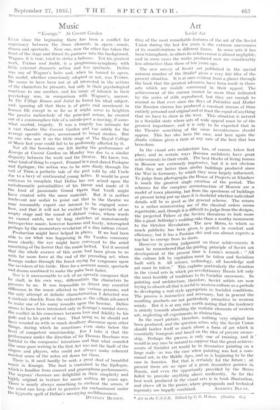Music "Koanga." At Covent Garden
EvEit since the beginning there has been a conflict for supremacy between the three elements in opera —music, drama and spectacle. Now one, now the other has taken the front of the stage and thrust its partners into the background. Wagner, it is true, tried to strike a balance. Yet his greatest work, Tristan fend Isolde, is a programme-symphony with little external dramatic action and less spectacle. Delius was one of Wagner's heirs and, when he turned to opera, his model, whether consciously adopted or not, was Tristan. He seems to have been not at all interested in the actions of the characters he presents, but only in their psychological reactions to one another, and his range of interest in their Psychology was, in comparison with Wagner's, narrow. In The Village Romeo and Juliet lie found his ideal subject, and, ignoring all that there is of gusto and merriment in human life except in so far as it might serve to heighten the passive melancholy of the principal actors, he created out of a commonplace tale of a suicide-pact a moving, if some- What morbid, tragedy. It was a tragedy too intimate for a vast theatre like Covent Garden and too subtle for the average operatic singer, accustomed to broad strokes, But no one who saw it on the little stage at The Royal College of Music last year could fail to be profoundly affected by it.
Not all the boredom one felt during the performance of
Roattga at Covent Garden on Monday was due to a similar disparity between the work and the theatre. We knew, too, :what kind of thing to expect. Framed in'a Post-dated Prologue and Epilogue, the action was to be seen dimly through the veil of Time, a pathetic tale of the past told by old Uncle Joe to a bevy of sentimental young ladies. It would be poor criticism to complain that Delius has not seized upon the melodramatic potentialities of his theme and made of it the kind of passionate Grand Opera that Verdi might have created with the same material. But it is neither irrelevant nor unfair to point out that in the theatre we May reasonably expect our interest to be engaged some- how, and that it will not be excited by the spectacle of an empty stage and the sound of distant voices, whose words We cannot catch, nor by long stretches of monotonously introspective music, however luscious and lovely, interrupted perhaps by the momentary revelation of a dim tableau vivant.
Production might have helped in places. If we had been
able to see What was happening in the Voodoo ceremony More clearly,' the eye might have conveyed to the mind Something of the horror that the music lacked. Yet it seemed that the whole essence of this scene had been given to us with far more force at the end of the Preceding act, when l[Coanga rushes through the forest crying for vengeance upon the ravishers of his bride. Here for a moment music, spectacle and drama combined to make the pulse beat faster.
or is it unreasonable to •ask of an operatic composer that
lie shall, in his own way, differentiate the characters he Presents to us; It was impossible to detect any essential difference in the music allotted to the various persons, and the only attempt at definite characterisation I detected was a sardonic chuckle from the orchestra as the villain advanced to make one of his many assaults upon the heroine. Delius seems to have been interested only in Koanga's mental stress, the conflict in his conscience between love and fidelity to his gods and to his pride of race. That being so, he. should not have wearied us.with so much desultory discourse upon other things, during which he sometimes even sinks below the
Level of competent musicianship. For I take it that the Performance under the direction of Sir Thomas Beecham was faithful to the composers' intentions and that what sounded like some poor writing in the first Act was not the fault of the singers and players, who could not always make coherent musical sense of the notes set down for then-i. There is, it need hardly be said, a great deal of beautiful
tnusie in Koanga. The best is contained in the Epilogue, which is familiar from concert and gramophone performances. The. negroes' choruses, are delightful in their simplicity and highly original in texture for music written 40 years ago. There is nearly always something to enchant the senses, if the mind can keep alert to perceive .the enchantment under the hypnotic spell of Delius's unvarying mellifluousness.
DYNELEY HUSSEY.














































 Previous page
Previous page